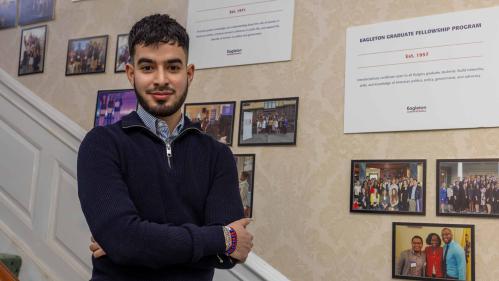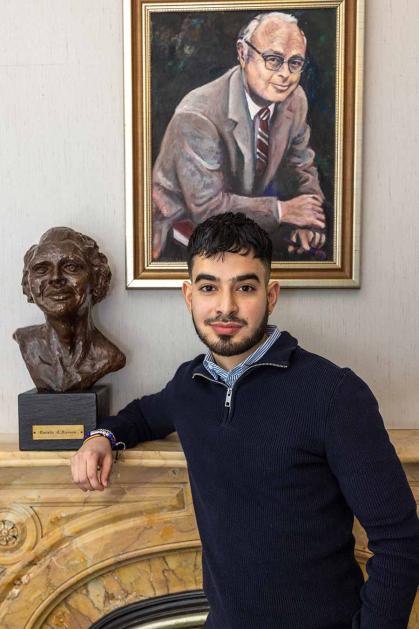From Fear to Freedom and Hope: A Venezuelan Student’s Journey

Pursuing a college education and the American dream, Rafael Escalante departed the embattled South American nation and made his way to New Jersey
Rafael Escalante escaped politically motivated persecution as a teenager in Venezuela to find his place – and a brighter future – at Rutgers University-New Brunswick.
In September 2019, he and his mother left the South American nation, where Escalante feared persecution for opposing what he describes as an autocratic government, and made their way to New Jersey. Returning in the fall as a senior majoring in political science and public policy at the School of Arts and Sciences and the Edward J. Bloustein School of Planning and Public Policy, Escalante continues to advocate for democracy and human rights – both on and off campus.
Despite experiencing hardship and heartache, Escalante said he has little time to feel depressed.
Hope, he said, “is what helped me to wake up every day and try to do something. Giving up is not an option.”
The 23-year-old is accustomed to adversity. As a teenager growing up in a middle-class, single-mother household in an economically troubled nation overseen by an increasingly authoritative government, Escalante experienced a sharp turn of events in 2016, when his grandmother died.
“She couldn't get the medication she needed because of this scarcity ... a consequence of government policies that made it impossible for people to get medicines,” said Escalante. “And that started a spiral of things that changed my life.”
Around this time, his parents’ company, where his mother had worked for nearly 30 years, went bankrupt “because of the economic policies of the Venezuelan dictatorship,” Escalante said.
“My mom was struggling to get food on the table,” he said. “There was a time in which we barely had food. She did everything she could to provide, and sometimes she didn't even eat just to ensure that I was eating right.
“There was a week I remember in which she bought a chicken breast and she cut it into tiny little pieces and she added a lot of vegetables so it would last for a week. One chicken breast, which for American standards, you eat for lunch, right?”
That same year, his father left the country, selling his belongings and moving to Chile to start again.
As a gay teen in Venezuela, Escalante also faced homophobia and feared political persecution, being tortured or even killed.
“I grew up hiding in the closet, pretending I was someone I was not,” he said.
At age 15, Escalante joined Primero Justicia (Justice First), a Venezuelan political party, and participated in rallies protesting against dictatorship. The teen received threats on social media and narrowly escaped arrest during a peaceful demonstration in January 2019.

“I was willing to go to prison for my country,” he said. “There was a point at which I was willing to die. That's how passionate I was about it. What I was not willing to do was go through the torture. Venezuela is notoriously famous for how much they torture their political prisoners.”
When he was 17, Escalante and his mother fled the country. His first attempt to leave Venezuela was thwarted by the military. Scared but determined, Escalante succeeded on his second try.
“I had to believe that something better was going to come after I tried to leave the country first time, and I had to have hope that I was going to be able to make it to America,” Escalante said. “My other option was giving up, staying in Venezuela and probably, I don't know, be dead at this point.”
When his mom returned to Venezuela to handle matters such as selling the family home, she couldn’t immediately return because of COVID-19 travel restrictions.
On his own and still learning English, Escalante learned to survive on his own as a teenager. He found a room to rent in West New York, N.J., and worked two fast-food jobs – at Popeyes and Dunkin’ Donuts – while attending Memorial High School.
He struggled navigating a complex asylum process that initially proved all but impossible since he was a minor without parents or guardians in the states. Seeking financial aid for college also proved complicated.
Escalante’s high school teachers and others encouraged him to share his story with politicians, university administrators and other state figures wielding power. While Escalante was accepted to Rutgers for his academic merits, local leaders and state elected officials helped him secure financial aid.
Now a Lloyd C. Gardner Fellow researching the negative impacts of populism, Escalante finds himself plenty busy between his studies. He attended the first Byrne Seminar held by Jonathan Holloway, the former president of Rutgers. Escalante also served as president of the Rutgers University Democrats (the university’s largest student-run partisan organization by membership) and, ahead of the Nov. 5 election, campaigned for Sen. Andy Kim. Over the summer in 2024, he interned for Make the Road New Jersey, a community organization that advocates for immigrant and working-class communities in the state. In addition, Escalante was accepted to be an Eagleton undergraduate associate at the Eagleton Institute of Politics.
Matt Matsuda, a professor in the Department of History and faculty director of the Lloyd C. Gardner Fellowship Program, described Escalante as smart, personable and charming.
“He’s always wanted to give back locally to his community, especially since becoming a Rutgers student, with a focus on supporting first-generation students going to college,” Matsuda said.
He’s always wanted to give back locally to his community, especially since becoming a Rutgers student, with a focus on supporting first-generation students going to college.
Matt Matsuda
Professor and faculty director of the Lloyd C. Gardner Fellowship Program
The professor added, “You might imagine him as a tough, cynical, political operative. He’s tough, but extraordinarily idealistic and artistic. In fact, his dedication in high school was to the performing arts and he’s funny and graceful. That life was cut short by the protests and political gatherings in Venezuela.”
Hurdles remain, but Escalante said he aims to make the most of his time at Rutgers. He participated in Rising Scholars, a program offered through the Office of Distinguished Fellowships that is designed to introduce undergraduate sophomores and juniors from underrepresented backgrounds to fellowship opportunities.
This summer, Escalante headed to Ann Arbor, Mich., where he joined the University of Michigan’s Gerald R. Ford School of Public Policy as a fellow in the Public Policy and International Affairs (PPIA) Junior Summer Institute, a program for undergraduate juniors committed to public service careers. He and other PPIA fellows spent several weeks receiving public policy and leadership training and opportunities to network. Moreover, Escalante recently was selected as one of five Rutgers students to join the Ralph W. Voorhees Fellowship Program in Public Service at the Bloustein school.
“My goal was college,” said Escalante, who hopes to attend law school. “That was my dream in Venezuela, and my goal was to continue following on my dreams as much as I could.”
Neal Buccino contributed to this article.




